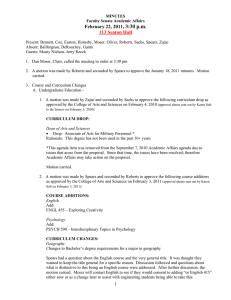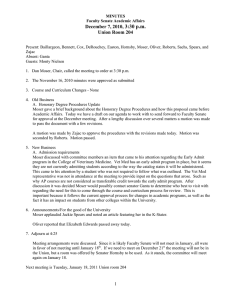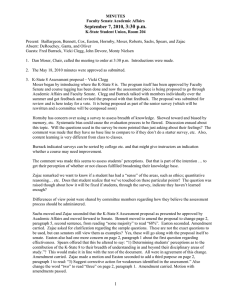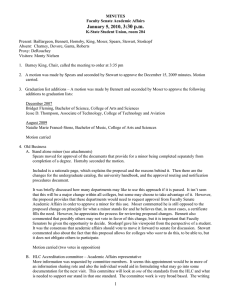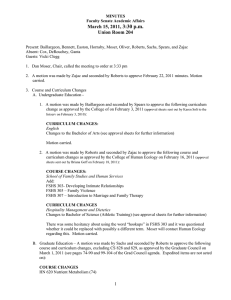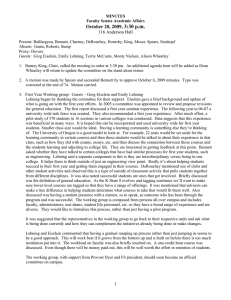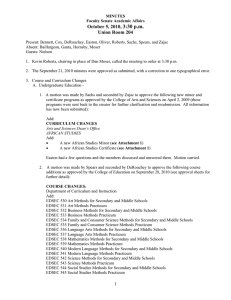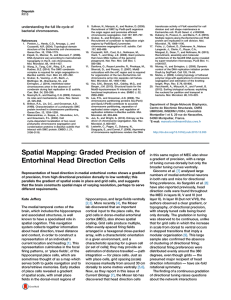3:30 p.m. November 2, 2010, Union Room 204
advertisement
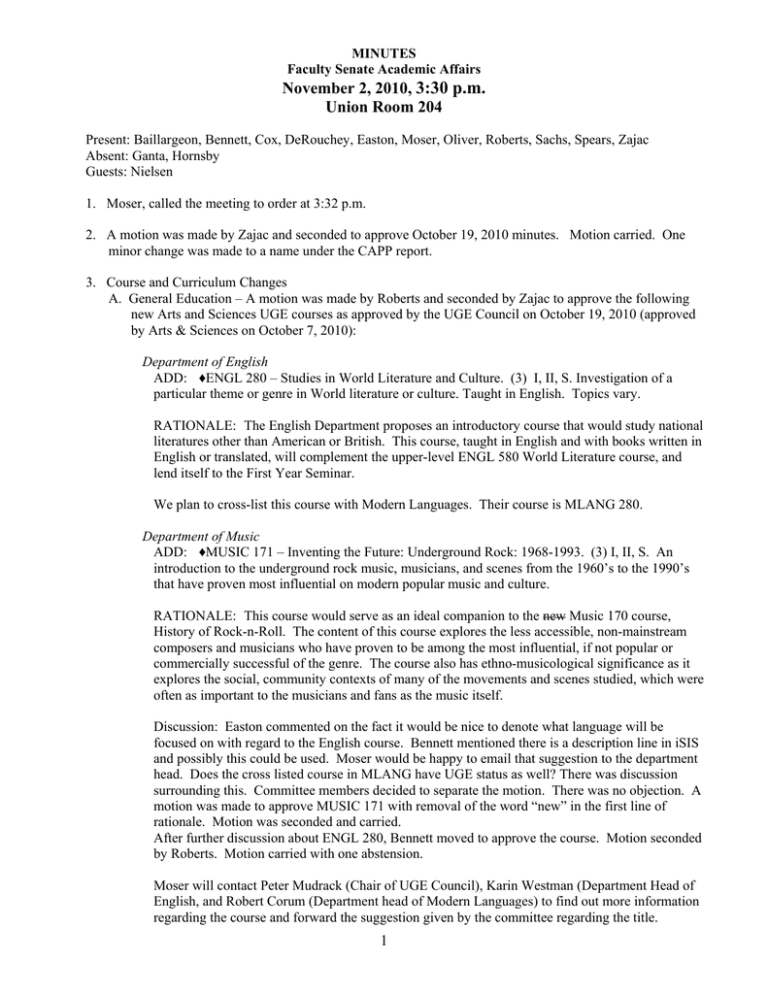
MINUTES Faculty Senate Academic Affairs November 2, 2010, 3:30 p.m. Union Room 204 Present: Baillargeon, Bennett, Cox, DeRouchey, Easton, Moser, Oliver, Roberts, Sachs, Spears, Zajac Absent: Ganta, Hornsby Guests: Nielsen 1. Moser, called the meeting to order at 3:32 p.m. 2. A motion was made by Zajac and seconded to approve October 19, 2010 minutes. Motion carried. One minor change was made to a name under the CAPP report. 3. Course and Curriculum Changes A. General Education – A motion was made by Roberts and seconded by Zajac to approve the following new Arts and Sciences UGE courses as approved by the UGE Council on October 19, 2010 (approved by Arts & Sciences on October 7, 2010): Department of English ADD: ♦ENGL 280 – Studies in World Literature and Culture. (3) I, II, S. Investigation of a particular theme or genre in World literature or culture. Taught in English. Topics vary. RATIONALE: The English Department proposes an introductory course that would study national literatures other than American or British. This course, taught in English and with books written in English or translated, will complement the upper-level ENGL 580 World Literature course, and lend itself to the First Year Seminar. We plan to cross-list this course with Modern Languages. Their course is MLANG 280. Department of Music ADD: ♦MUSIC 171 – Inventing the Future: Underground Rock: 1968-1993. (3) I, II, S. An introduction to the underground rock music, musicians, and scenes from the 1960’s to the 1990’s that have proven most influential on modern popular music and culture. RATIONALE: This course would serve as an ideal companion to the new Music 170 course, History of Rock-n-Roll. The content of this course explores the less accessible, non-mainstream composers and musicians who have proven to be among the most influential, if not popular or commercially successful of the genre. The course also has ethno-musicological significance as it explores the social, community contexts of many of the movements and scenes studied, which were often as important to the musicians and fans as the music itself. Discussion: Easton commented on the fact it would be nice to denote what language will be focused on with regard to the English course. Bennett mentioned there is a description line in iSIS and possibly this could be used. Moser would be happy to email that suggestion to the department head. Does the cross listed course in MLANG have UGE status as well? There was discussion surrounding this. Committee members decided to separate the motion. There was no objection. A motion was made to approve MUSIC 171 with removal of the word “new” in the first line of rationale. Motion was seconded and carried. After further discussion about ENGL 280, Bennett moved to approve the course. Motion seconded by Roberts. Motion carried with one abstension. Moser will contact Peter Mudrack (Chair of UGE Council), Karin Westman (Department Head of English, and Robert Corum (Department head of Modern Languages) to find out more information regarding the course and forward the suggestion given by the committee regarding the title. 1 4. Old Business A. Aerospace Minor Update – Arts and Sciences approved October 7, 2010 (put on hold at last meeting) Moser met with the Department Head of Aerospace Studies and posed the following questions to him. Why are you adding a minor while another is being dropped? The response was that basically a philosophical difference between the departments exists. They feel the minor is of value to their students in noting it along with their earned degree and they wish to pursue it. Moser mentioned that it seems best to use the word “students” instead of “cadets”. There was no objection to this and we are welcome to change the terminology. Do they feel the program will succeed? The department has not, up until this time, encouraged this to their students, but they intend to and believe students will respond and therefore the minor will succeed. Also, there are other minors with this same title at other colleges. They feel this was used consistently and would like the title to remain as it is. Can students take courses even without service agreement? All courses are open to any student, with the exception of the summer course, which is a unique course and a student must be chosen to participate. The minor really IS for ROTC students. Spears conveyed her concern that a student would be disqualified from the program because of the summer course. Also, Zajac had concerns over the fact that a student could be dropped for non-academic reasons. It doesn’t appear it’s an academic program if you can be dismissed for non-academic reasons. It was discussed that possibly there would need to be a substitute to this summer course so that a student could fulfill the minor, even if they don’t get accepted in future for military duty. Easton believes it still has value even if a student doesn’t join Air Force. There were strong feelings that as an academic program, it needs to follow academic standards. It should be accessible to all students regardless of what an outside institution’s standards are. Consensus was that the minor would be acceptable without the last summer course. Could it be dropped all together as a requirement, or would there need to be a substitute course? It was agreed to leave it on the table until the next meeting. Moser will meet one more time with the Department Head to see if the department is willing to make some changes to the proposal. B. K-State 8 Assessment piece – update This will be on FS agenda for November 9 and could either be voted on or acted on at a future meeting. C. Stand Alone Minor implementation Moser noted that Engineering is working on putting forward their stand alone minor in Nuclear Engineering. Nielsen made a brief comment about the progress of the ad hoc committee working on implementation procedures. D. Pre proposal of thematic sequences – Business Administration Moser reminded committee members that at the last meeting a conversation was started regarding thematic sequences for the College of Business Administration. Should Academic Affairs approve each sequence (pre professional curriculum re-write)? There was a conversation among committee members regarding what items go through expedited and non-expedited process. It seems to be a unique situation where it could go through an expedited process. Members felt that Academic Affairs would not need to approve individualized sequences, but could approve a set on a larger scale, or a shell. This was described as a career path within business. This is part of the Business Administration Pre Professional program. Business Administration has asked for guidance from Academic Affairs and so there is the opportunity to give advice before the proposal is submitted. Spears noted that Architecture seems to have a precedent in handling these and perhaps Business could follow that example. It was suggested perhaps a single rationale or justification and then an outline of the proposal could be submitted to Academic Affairs for review and approval. This would not be a new degree or new program. The question was asked: How do they plan to follow up with the courses to make sure they’re still functioning? They would need some mechanism to follow up on courses in other colleges to make sure they are still available in a sequence. 5. For the good of the University 6. The meeting adjourned at 4:43 p.m. Next meeting is Tuesday, November 16, 2010, Union Room 204 2
